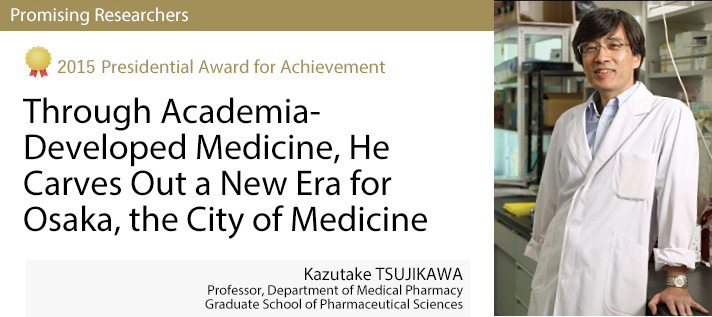
Kazutake TSUJIKAWA, Professor, Department of Medical Pharmacy, Graduate School of Pharmaceutical Sciences
Professor Kazutake TSUJIKAWA is continuing to develop new drugs based on the discovery of genes related to the progression of pancreatic cancer. With a longing for the far off sky which began in his childhood, Professor Tsujikawa currently has turned his interests to research on microscopic human cells. This two may seem completely opposite, but Professor Tsujikawa ensures, “The profoundness of the mechanisms of cells rivals that of space itself. Cells may seem very close, but space and cells both share traits of having places that we just can’t seem to reach.” He’s come this far on his current path because “if you can help people, then it’s worth devoting your life to it. But,” he continued, “no matter how many decades you devote, you’ll always have a ways to go.”
Wanting to create medicine, Professor Tsujikawa entered a pharmaceutical company after finishing graduate school. However, due to the division of labor in the drug development system, he returned to scholarship as a research student in the Graduate School of Pharmaceutical Sciences at Osaka University with the hopes of “finding medicine, getting on the factory line, and seeing the smiles on patients’ faces.”
Genetic engineering had not been established in the Graduate School of Pharmaceutical Sciences at the time, and Professor Tsujikawa, then an assistant, aimed to make use of molecular biology in the world of pharmaceutical sciences, traveling to the USA. “The children who I met with at Harvard Medical School where I was studying were suffering from adverse reactions, and eventually, I never saw them again. This was a shock to me. I was fiercely determined to make a cure. Ever since then, I’ve kept running down this path of cancer treatment and molecular cell biology.”
In 2015, a key element of the government’s growth strategy, the Japan Agency for Medical Research and Development (AMED), began. A hub for drug development by academia was established at Osaka University as well, with Professor Tsujikawa in charge. “Being a ‘city of medicine,’ leading edge research has always been conducted in Osaka. I want to create academia-developed drugs that are effective in fighting refractory diseases,” he said. He never did reach the heavens, but he continues his daily fight toward his goal to help patients in the microscopic world.
About Kazutake TSUJIKAWA
Professor Tsujikawa graduated from the Osaka University of Pharmaceutical Sciences, after which he entered a pharmaceutical company. He returned to the Graduate School of Pharmaceutical Sciences as an assistant in 1988. After doing research overseas at Harvard University, he became a professor in the Department of Applied Biopharmaceutical Sciences, Graduate School of Pharmaceutical Sciences. Professor Tsujikawa then became a professor in the Department of Medical Pharmacy at the same graduate school, as well as a professor at the Drug Innovation Center, Graduate School of Pharmaceutical Sciences. Various awards and achievement include the Japan Society for Biomedical Research on Trace Elements Award (1992), The Japanese Society of Immunotoxicology Award (2006), and the BioBusiness Award Japan (2011). Professor Tsujikawa specializes in molecular and cellular biology and drug development for cancer treatment. This will be the fourth year in a row in which Professor Tsujikawa has received the Presidential Award for Achievement.